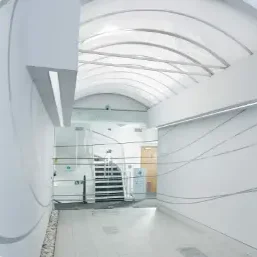Professor Gideon Lack
MBBCH (Oxon) MA (Oxon), FRCPCH, FMedSci
Consultant Paediatrician
Specialties at a glance
Professor of Paediatric Allergy, King’s College London Head of the Clinical Academic Paediatric Allergy Service, Guy’s St. Thomas’ NHS Foundation Trust. Specialties Include:
- Allergies & immunology – adult & paediatric
- Allergen desensitisation
- Allergy blood tests
- Allergy shots (immunotherapy)
- Allergic rhinitis (hayfever)
- Animal dander allergies
- Food allergies
- Drug allergies
- Anaphylaxis
- Desensitising vaccines to treat hayfever and other allergies
- Insect or bee sting allergies
- Asthma
- Angioedema (swelling)
- Conjunctivitis (pink eye)
- Eczema (atopic dermatitis)
- Wheezing

About Professor Lack
Gideon Lack is Professor of Paediatric Allergy at King’s College London and Head of the Academic Paediatric Allergy Service at Guy’s & St Thomas’. He studied medicine at Oxford University before training as a Paediatrician in New York and specialised in Allergy at National Jewish Center in Denver, Colorado. He was Professor of Paediatric Allergy and Immunology at Imperial College London, where he worked for 12 years before moving to King’s College London in 2006.
His research focuses on the prevalence of food allergies in children and the relationship between food allergies, eczema, and asthma. He works on novel immune-modulatory treatments for food allergies and on developing new strategies to prevent the development of allergies and asthma in children and adults.
The LEAP (Learning Early About Peanut allergy) study, published in the New England Journal of Medicine (2015) showed that early consumption of peanuts in atopic infants reduces the development of peanut allergy by >80%. In 2016-17, these findings were translated into changes in public health policy in the USA (National Institute of Allergy and Infectious Diseases, a division of the US Department of Health and Human Services, Addendum Guidelines for the Prevention of Peanut Allergy in the United States) and Australia. Recommendations to introduce peanut in children 4-6 months of age at high risk of developing peanut allergy.
Prof Lack serves as a Member of Scientific Advisory Board at DBV Technologies S.A. He is a Member of the British Medical Association (BMA), The European Academy of Allergology and Clinical Immunology (EAACI) and the Royal College of Paediatrics and Child Health and a Fellow of the Academy of Medical Sciences.
NHS and Academic Posts
Professor of Paediatric Allergy, King’s College London, NHS Consultant Paediatric Allergist & Immunologist, Guy’s & St Thomas’ NHS Foundation Trust, Head of the Clinical Academic Paediatric Allergy Service, Guy’s & St Thomas’ NHS Foundation Trust
Additional information
Professor Lack Speaks French, Spanish & Hebrew.
Research
Gideon Lack’s translational research has revolutionised the field of food allergy and brought about major changes in public health policy. He has challenged the conventional wisdom that the avoidance of allergy consuming foods in early infancy such as peanut and egg, will prevent the development of food allergies. He has conclusively demonstrated in randomised controlled trials that hundreds of thousands of new cases of peanut allergy worldwide can be prevented every year through the early consumption of peanut in infants with eczema. This strategy provides long-term protection, and although it is antigen specific, he has now demonstrated the success of this approach to other food allergies such as hen’s egg allergy. Harnessing the power of oral tolerance induction is one of the great advances in the prevention of non-communicable diseases in childhood during the last few decades; two percent of children will develop peanut allergy and around 8% of children will develop food allergies and this can now be prevented. His work has resulted in the transformation of guidelines for sixteen national committees and led to new National Institutes of Health (USA) guidelines on infant weaning.
He has published extensively, more than 120 peer reviewed articles, with five articles in the New England Journal of Medicine, one as first author and three as senior author. Gideon Lack has promoted open science by sharing online with the public via Trialshare his original research data from his major clinical trials published in the New England Journal of Medicine. He has brought in substantial grant funding of more than £30 million during his career. He received the David Bovet Award 2018, the highest honour from the European Academy of Allergy and Clinical Immunology (seven thousand specialists) for his significant contribution to the field. He also won the American Academy of Allergy Asthma and Immunology Distinguished Scientist Award 2016 (8000 members) in recognition of his seminal work in food allergy.
Food allergies affect between 5-8% of primary schoolchildren in the UK. Peanut allergy affects more than 2% of schoolchildren in the UK and is a life-threatening lifelong disorder. Based on astute ecological observations Gideon Lack formulated the Dual Allergen Exposure hypothesis, postulating that infants with eczema develop allergy to peanut and other foods by exposure to food allergens through a disrupted skin barrier and that tolerance develops by early consumption. His seminal finding published in the New England Journal of Medicine in 2003 demonstrated that severe eczema in early infancy and the use of peanut oil containing emollients on the skin are associated with an increased risk of developing peanut allergy. He then demonstrated at the molecular level a gene-environment interaction between skin barrier dysfunction (filaggrin null mutations) and high levels of peanut exposure through the skin leading to peanut allergy.
In contrast, based on international ecological studies that he conducted, he proposed that early consumption of peanut and other allergenic foods through oral tolerance induction prevents the development of peanut allergy. He demonstrated this in the LEAP study, the first randomised controlled trial introducing peanut into the diet of high-risk infants with eczema. He showed that this reduced the development of peanut allergy by 81%. He further demonstrated in the LEAP-On study that this protection was long lived and did not require ongoing consumption of peanut. Both studies were published separately in the New England Journal of Medicine. His further work extended the possibility of oral tolerance induction to other foods especially egg, in the EAT study, a large randomised controlled study of 1306 normal infants, published in the New England Journal of Medicine. Furthermore, he demonstrated that oral tolerance induction to foods is antigen specific and that early consumption of peanut prevents peanut allergy but no other food allergies whereas consumption of egg prevents egg allergy.
Gideon Lack’s work is underpinned by basic mechanistic research. He has developed novel techniques to study allergen specific T helper cells and has defined the role of T helper 2 and T helper 9 lymphocytes in peanut allergy. He developed a new functional diagnostic test to diagnose peanut allergy, the Basophil Activation Test, which is highly specific and sensitive in the diagnosis of peanut allergy and replaces the need for large numbers of food challenges. This assay also allows prediction of threshold of reactivity to individual foods and prediction of severity. The novel bioassay is now being used to monitor clinical response to treatment in oral immunotherapy studies.
His discoveries provide a novel, simple, and effective strategy to prevent the development of hundreds of thousands of new cases of food allergy every year. His LEAP study was awarded the prestigious David Sackett Clinical Trial of the Year Award 2015 from the Society for Clinical Trials which presents this international award across all clinical specialties to “a randomised clinical trial published in the previous year that best… improves the lot of humankind; provides the basis for a substantial, beneficial change in healthcare.”
Articles & Videos
Search treatments & services A-Z
Search for a specific treatment or service.
Contact the appointments team
If you have any questions or want to book an appointment, please speak to our team on +44 (0)800 0483 330.
If you wish to book online, for private GP appointments, please use our GP appointment form.
Or, make an enquiry online using this form and one of our team will be in touch. Please note, all the information collected is required as part of our registration process. By using this form you agree with the storage and handling of your data by our team. You don't need a referral from your GP to make an appointment with us.
Contact London Medical
London Medical is located in the Harley Street medical area. Together with top experts across a range of multi-disciplinary fields, we offer the finest facilities for your care, all under one roof.

Monday to Friday 8.30am to 8pm
Monday to Friday 8.30am to 8pm
Monday to Friday 8.30am to 8pm
